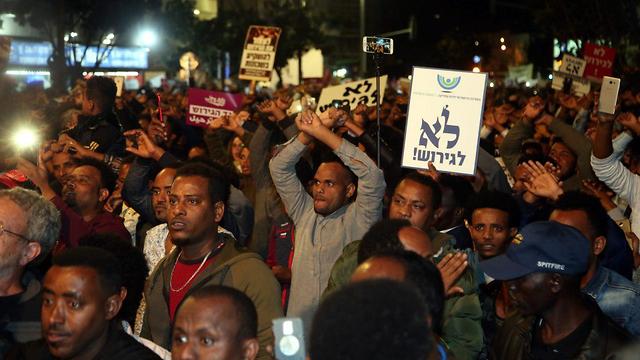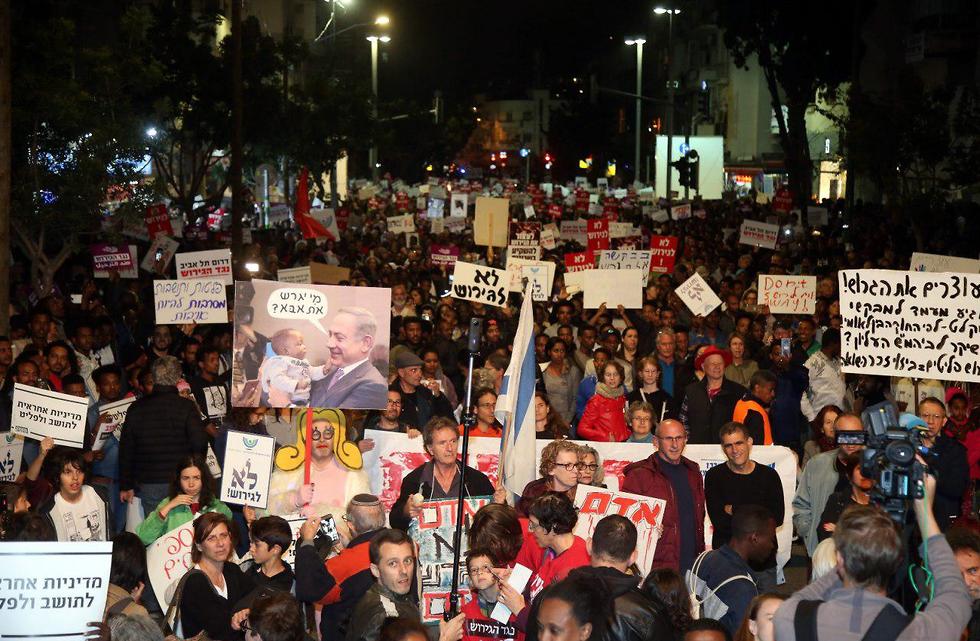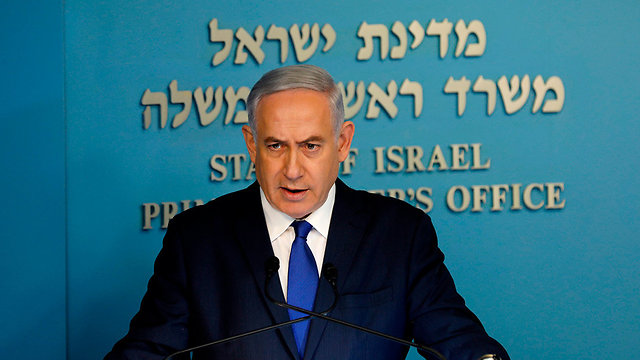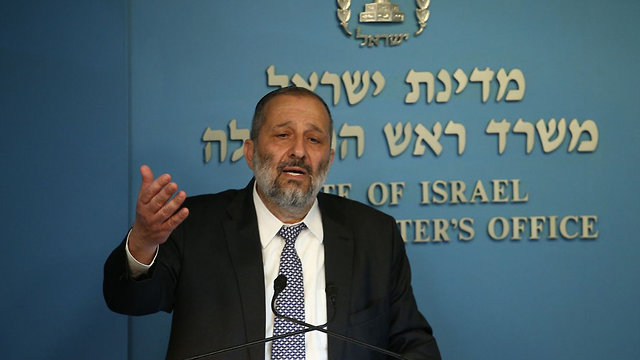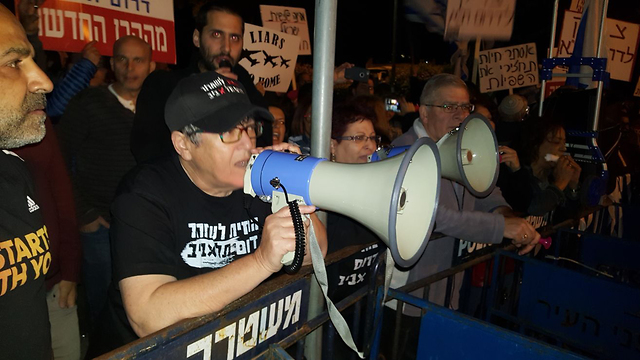
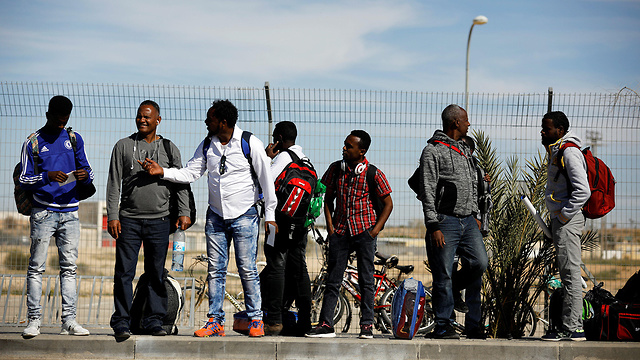
Israel reaches agreement with UN to resolve African migrants crisis
UN High Commission for Refugees commits to finding place for at least 16,250 of the Eritrean and Sudanese asylum seekers in Western countries, while Israel will grant legal status to the remaining refugees; controversial mass deportation plan nixed.
Israel has reached an agreement with the United Nations High Commission for Refugees to resolve the African migrants crisis, nixing the government's controversial mass deportation plan.
According to a report by the Population and Immigration Authority concluding 2017, there are 34,187 asylum seekers from Sudan and Eritrea in Israel.
As part of the new outline, the UN High Commission will work to reach agreements with different Western countries to take in at least 16,250 of the Sudanese and Eritrean asylum seekers. Within a year and a half, the first 6,000 asylum seekers will leave for Western countries, and within five years the remaining 10,250 will leave Israel.
Israel, in turn, will grant legal status to protected populations among the asylum seekers, some 18,000 refugees who would've remained in the country regardless.
The new plan will be implemented in three stages over five years, at the end of which the residents of south Tel Aviv, where many of the migrants currently reside, will be able to see a significant improvement in living conditions.
The new outline would allow the removal of many more African migrants from Israel than the deportation plan would have and has the added advantage of the backing of the UN and the international community.
The outline has been approved by the attorney general and is also in line with international law and common practices.
The outline will also see the establishment of a special administration entrusted with the rehabilitation of southern Tel Aviv. The administration will be headed by former MK Avigdor Yitzhaki and include representatives of the Tel Aviv-Jaffa municipality and the southern Tel Aviv neighborhoods.
The budget and resources allocated for the implementation and enforcement of the nixed plan will instead be invested in the development and rehabilitation of south Tel Aviv.
In addition, as part of the new plan, the Israeli government will work to encourage the African migrants who remain in the country to spread nationwide, while providing them with occupational guidance and vocational education, helping them find employment and more.
"In light of the fact the State of Israel and the United Nations High Commission are joining forces to implement this outline, there is no longer any need to continue the policy of forced removal to third countries," the Prime Minister's Office said in response.
"The prime minister and the interior minister had worked to advance the previous outline, but due to legal constraints and diplomatic difficulties raised by the third countries, the need arose to reach new and improved understandings that would ensure the continued departure of thousands of immigrants from Israel, as well as comprehensive treatment of the problem."
The signing of the outline by the UNHCR was "essential for its approval, since it, in effect, legitimizes it, said a senior legal source involved in the issue.
"The UN's sponsorship will also lead to the rejection of any additional petition that will be filed to the High Court of Justice (on the issue)," the source said, adding that accusations of forced expulsions made against Israel are now just another problem off the state's back.
Speaking at a press conference broadcast on live television, Prime Minister Benjamin Netanyahu said the "landmark achievement" will see 16,250 asylum seekers out of the country, taken to "developed countries like Canada, or Germany and Italy" as part of a measure the UNHCR has committed to organize "and even fund."
Netanyahu explained that the planned expulsion had to be aborted because Rwanda, which he referred to as "the third country," did not meet the conditions to absorb the asylum seekers, as was initially intended, and collapsed under the international pressure exerted on it.
"From the moment that it became clear in the last few weeks that the third country as an option does not exist, we in effect entered a trap that meant all of them would stay," he informed.
Netanyahu added that the agreement with the UN, as it currently stands, came following strenuous political efforts on their part, noting that at first the UN wanted Israel to keep four asylum seekers as temporary residents for every one deported.
"We did not agree to this, and in the end reached an agreement whereby for each one that leaves, one will remain," he said.
Netanyahu concluded by stressing that while he, like many others, expected Israel to be able to deport the lot of them, once it was clear it is not an option, the government decided to "do the best it can—get some out, rehabilitate the rest and rehabilitate southern Tel Aviv."
Later that evening, Netanyahu published a video in which he gave further details on the outline.
"We will remove the infiltrators from south Tel Aviv, bring them to moshavim, kibbutzim, and strong communities, so that the burden will not fall on neighborhoods in distress," he said. "The money we'll save, and that's a lot, we'll invest in rehabilitating southern Tel Aviv."
He then noted that the new agreement will see 2,000 more immigrants expelled from the state compared to the previous plan, and that "those who will stay, will remain here temporarily for the next five years."
Interior Minister Aryeh Deri, who attended the conference alongside the premier, said the agreement assures that anyone permitted to stay in Israel will receive a work permit so as to benefit the economy, and that he will have final say on where they live and work, allowing for their dispersion throughout the country.
He then conceded that locking-up illegal immigrants in detention facilities has proven itself to be "without much benefit," adding that closing them, as well as moving away from the previous mass deportation plan, will end up saving large sums of money better used to rehabilitate asylum seekers and south Tel Aviv
The minster noted that NIS 250 million were already saved from the closing of the 'Holot' detention center, and that hundreds of millions of shekels more were saved due to the previous plan involving considerable financial aid to the "third countries" in exchange for them accepting the immigrants.
He ended by thanking the prime minister and the mayor of Tel Aviv, Ron Huldai, who he said told him that should he have decided to inform him of the agreement with the UN the day before— April 1st—he would have dismissed it a prank since it is almost too good to believe.
While the UNHCR confirmed an agreement was signed with Israel, it did not name the countries that would accept the migrants, and some of the countries mentioned by Netanyahu deny any such agreement was signed with them.
A spokesman for the German Interior Ministry said he was unaware of any plans to resettle African migrants from Israel to Germany, And in Italy, a Foreign Ministry source said: "There is no agreement with Italy in the context of the bilateral agreement between Israel and the UNHCR."
Shortly after Italy's denial, the PMO issued a statement to Italian news agency ANSA, clarifying that Netanyahu only named Italy as an example of a developed Western country, and did not specifically mean to name it as one of the countries willing to take in the asylum seekers, Italian daily la Repubblica reported.
The Stop the Deportation Movement said in response to the agreement, "The forced expulsion to third world countries has been stopped. This is an unprecedented achievement, behind which are hundreds of thousands of Israelis who in recent months came out against the expulsion of asylum seekers to an unknown future. The agreement that was signed would not have happened without the dozens of organizations and the contribution of many citizens.
"There is a real opportunity for the State of Israel to make amends, create a responsible policy of dispersal and absorption, seriously examine the requests of the asylum seekers who will remain in Israel, and rehabilitate the southern Tel Aviv neighborhoods."
The Anti-Defamation League (ADL) also welcomed the suspension of the mass expulsion.
"We commend this humane action by the Israeli government to suspend the highly problematic plan to deport tens of thousands of asylum seekers to Africa, where many prior deportees have at times faced violence and even life-threatening conditions," said Jonathan Greenblatt, ADL CEO. "Israeli society has spent years grappling with this crisis, and working with the UNHCR and agreeing to absorb tens of thousands of asylum seekers into Israel is both an ethical and Jewish approach to this issue. We applaud the Israeli government for its efforts to resolve this challenging crisis responsibly."
Shefi Paz, head of the South Tel Aviv Liberation Front and a leading proponent of the mass expulsion, expressed her firm opposition to the new agreement, claiming it is "a disgrace to the State of Israel and a direct result of the total failure of years-long negligent policy."
Paz, a resident of southern Tel Aviv, added that the region's residents "will continue the struggle until the last infiltrator is gone from our neighborhoods."
Council leaders did not remain indifferent to Netanyahu's words, expressing objection to his stated plan to relocate asylum seekers to moshavim and kibbutzim.
"This is an unfortunate statement that does not deal with the problem," said head of the Merhavim Regional Council Shai Hajaj and head of the Sdot Negev Regional Council Tamir Idan in a joint statement.
"We understand the need to solve the problem of the infiltrators, but it is wrong to do so casually and at the expense of the moshavim and kibbutzim who are struggling with difficult economic problems."
President Reuven Rivlin congratulated Netanyahu, Deri and Director General of the Population and Immigration Authority, Shlomo Mor Yosef, on the outline, as well as on the establishment of a special administration for the rehabilitation of southern Tel Aviv.
He added it will enable the absorption of recognized asylum seekers into a "strong, values-based and powerful state (of Israel), to which the entire international community will look up."
The fate of some 37,000 Africans in Israel has posed a moral dilemma for a state founded as a haven for Jews from persecution and a national home. The right-wing government has been under pressure from its nationalist voter base to expel the migrants.
But the planned mass deportation led to legal challenges in Israel, drew criticism from the United Nations and rights groups and triggered an emotional public debate among Israelis.
Amir Alon, Adi Rozenberg and Moran Azulay contributed to this report.















